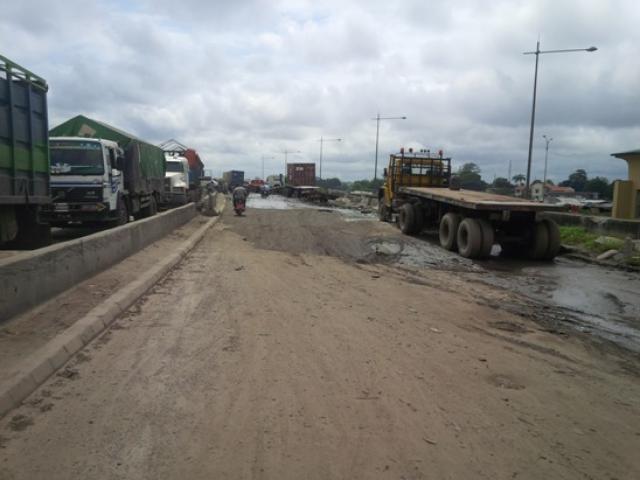Following the near collapse of cargo evacuation at the Tin Can Island Port (TCIP) as a result of the activities of a syndicate comprising security officials, the Federal Government, in December 2020, announced some measures and made some statements of intention, which it said would reverse the ugly trend at the busy port.
Maritime stakeholders have been crying painfully aloud over the deteriorating situation of the roads leading to the seaports in Lagos ports especially the Tin Can Island Port where congestion has reached an alarming proportion, and cargo evacuation has become almost impossible because of the activities of the syndicate.
A report had exposed a well-organised racket of security officials at the Tin Can Island Port Complex who extort between N70,000 and N200,000 per truck before allowing them into the port. This syndicate, which allegedly includes officials of the security department of Nigerian Ports Authority (NPA), police and the dismantled Presidential Task Team, has been making life unbearable for truck drivers, as well as making cargo evacuation from the port a nightmare.
Consequently, the cost of haulage within the Lagos area has become astronomical. The congestion at the Tin Can Island Port has become so bad that trucking a container from the port to the mainland, which is just about 20 kilometres, now costs about $4,000 (N1.5 million). That is almost the cost of shipping one container from China to Nigeria, a distance of 12,000 nautical miles.
Worse still, it is no longer a secret that a huge number of containers are trapped in the port and ships are being forced to remain at anchorages for up to three months, incurring various surcharges and forcing some shipping companies to increase freight charges. The congestion on the port road has also made cargo bound for Nigeria to be shipped via smaller vessels from ports in Cameroon, Congo-Brazzaville, Benin Republic and Ivory Coast.
This self-inflicted pain, according to reports, is costing Nigeria $55 million (N20.9 billion) a day in lost economic activities or over $19 billion annually — a loss that is more than half of the 2021 budget. All these cannot be allowed to continue. One is saddened that Nigeria is suffering all these indignities and losses because of the activities of some individuals who are employed to ensure smooth movement of trucks in and out of the ports, but who have converted the job into an ATM machine for themselves. This must not be allowed to continue. We hereby call on the government to take definite and decisive steps towards bringing an end to the activities of these unpatriotic Nigerians, which will in turn bring down the cost of haulage and redress the congestion on the port road.
We note that as a result of the public outcry, the government late last year dissolved the Presidential Task Team on Apapa Gridlock whose officials have been accused of being part of the syndicate. The Minister of Transportation, Rotimi Amaechi, also visited the Tin Can Island Port with ministry officials and heads of maritime agencies. We recall that after seeing the indiscriminate parking of trucks, which blocked access roads in the port environment, the minister said the chaotic situation must be addressed urgently in the interest of trade facilitation. He announced that he would meet relevant maritime agencies to deliberate on the issue. However, we do not believe that the meeting matters much because uncountable meetings have been held on the issue to no avail. The meeting in question will not be any different as it will still be another forum for discussion of the problem without any solution. What is needed is decisive policy decisions and action. Every word the minister utters must be matched with action, and every solution that is proffered must be strictly enforced, without fear or favour.
In addition to stopping the extortion of truck drivers by security agents, the multiple taxes they are forced to pay must also be looked into. We observe that apart from the illegal charges imposed on them on the port access roads, truck drivers still pay the Apapa Local Government authorities, transport unions and the Lagos State Wharf Landing Fee Agency, contrary to the provisions of the Nigerian Ports Authority Act.
It is indeed very sad that Nigeria has continued to score abysmally low in all indices of economic development. In its 2019 ports infrastructure report, the World Economic Forum ranked Nigeria 122 out of 139 countries with an abysmal score of 2.5 over 7.0, even less than less-endowed African countries like Zimbabwe, Zambia, Uganda, Burkina Faso, Angola and even neighbouring Cameroon. According to experts, with the African Continental Free Trade Agreement coming into effect, Nigeria will find it difficult to compete.
In the light of these, the government must stop paying lip service to the state of Lagos ports access roads and the maritime sector in general.
